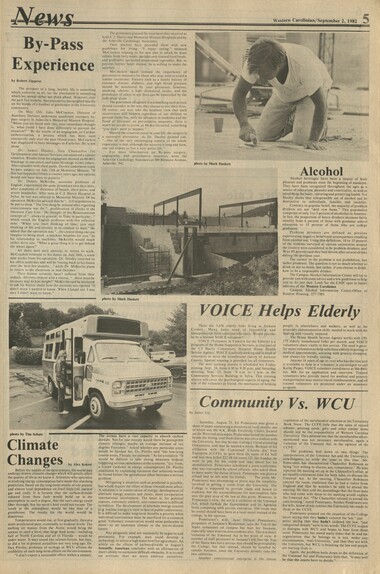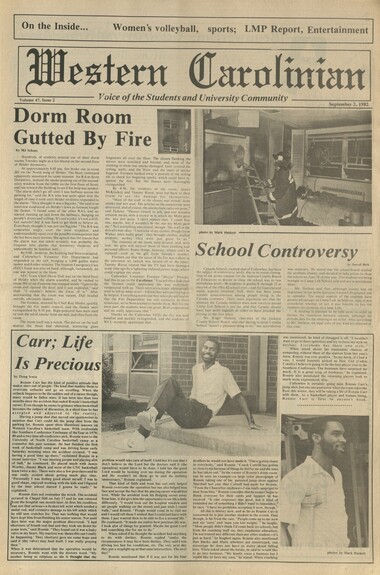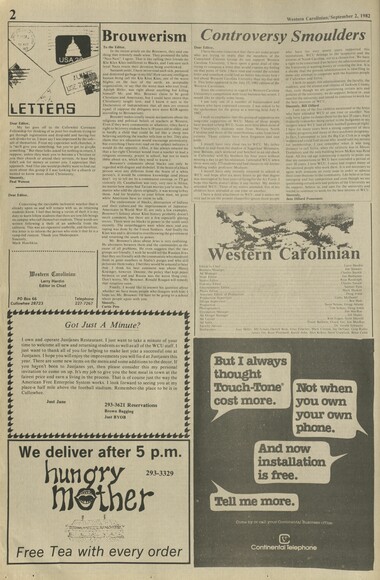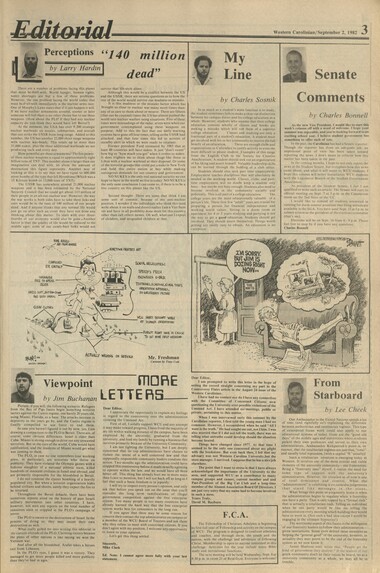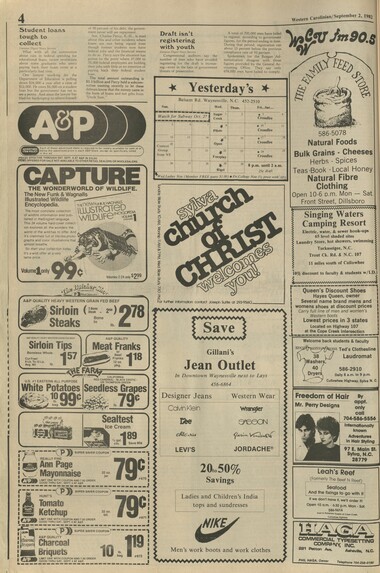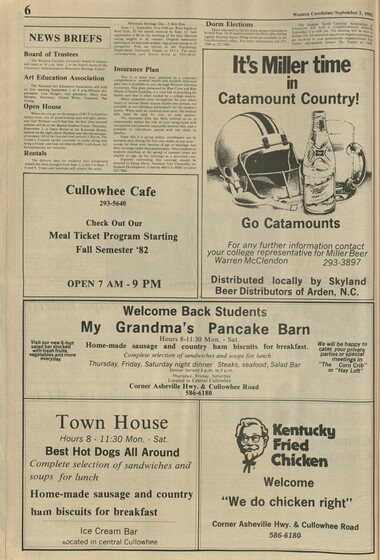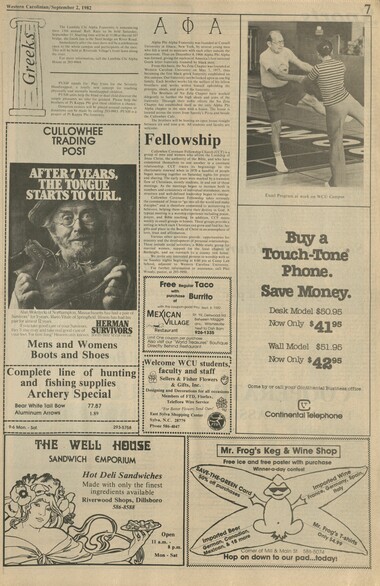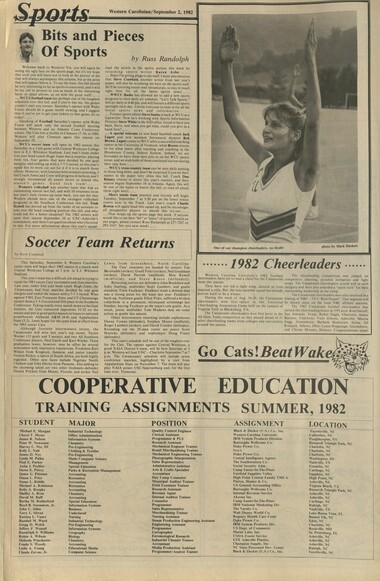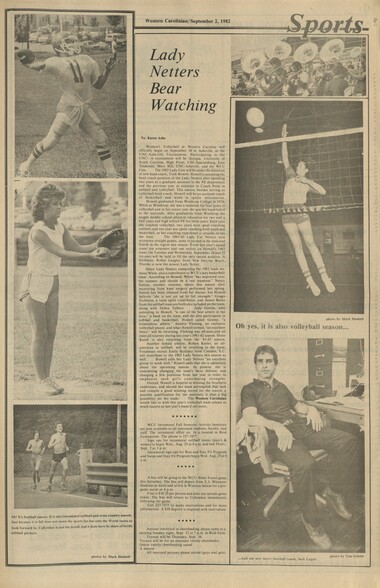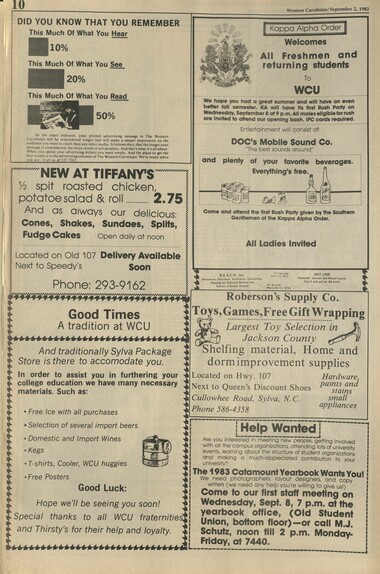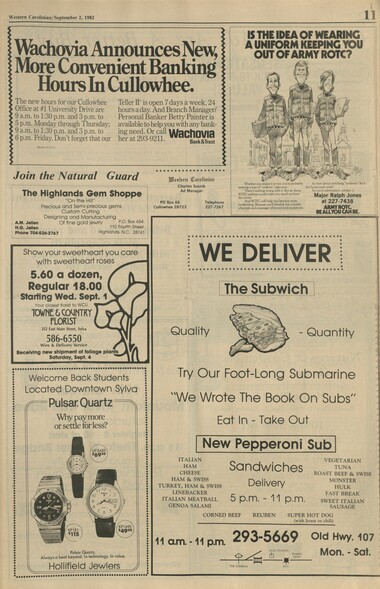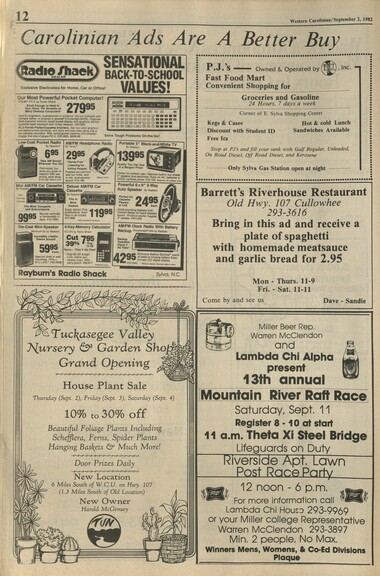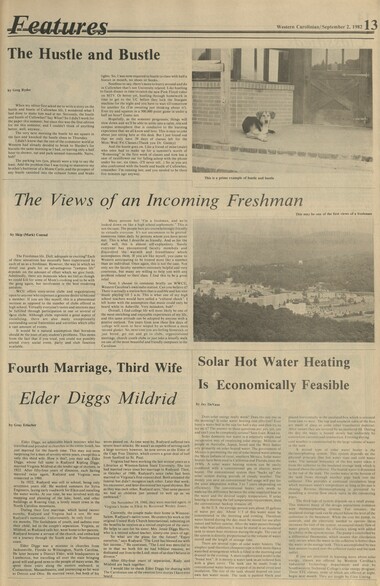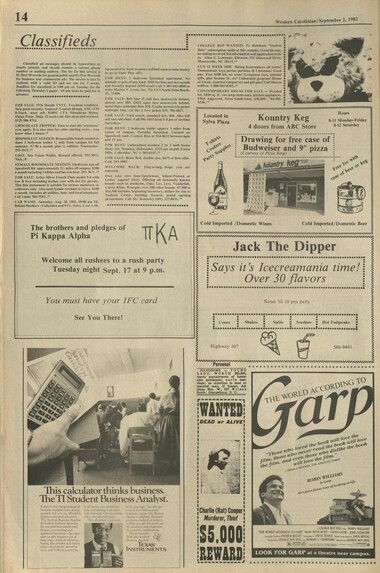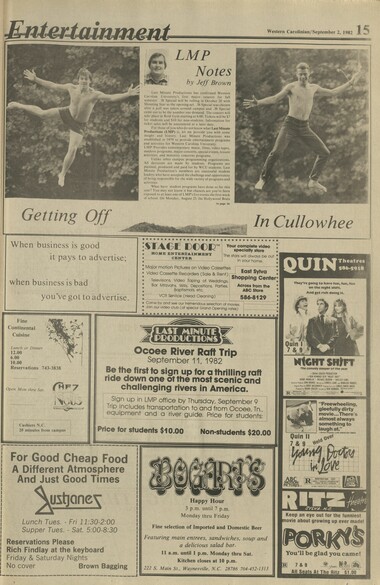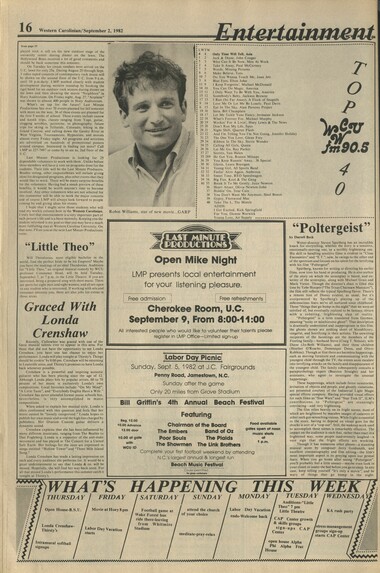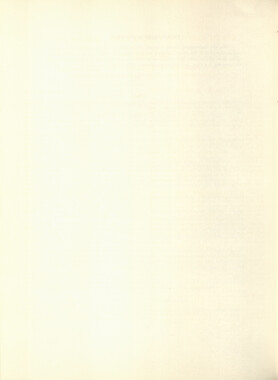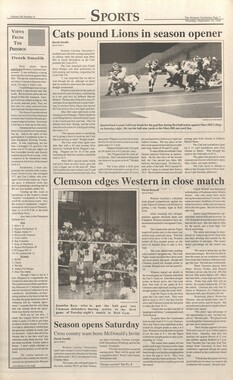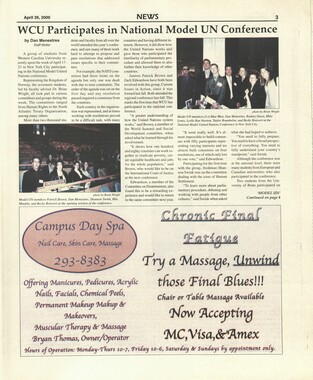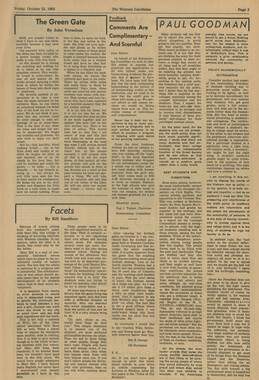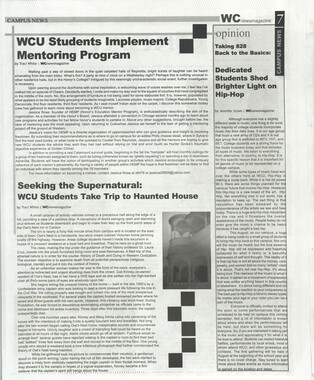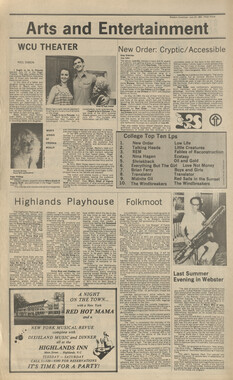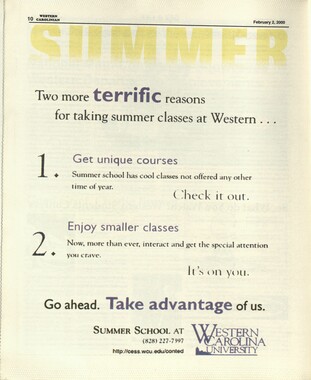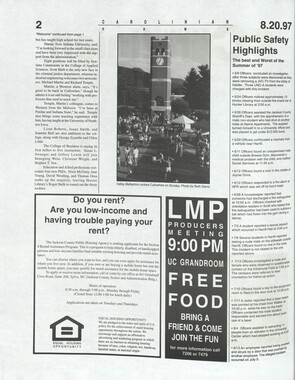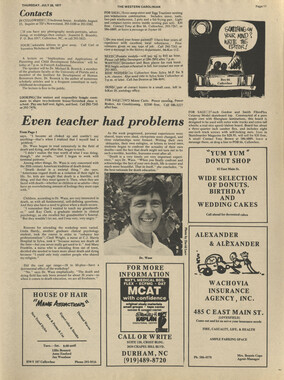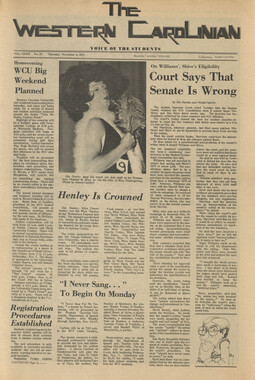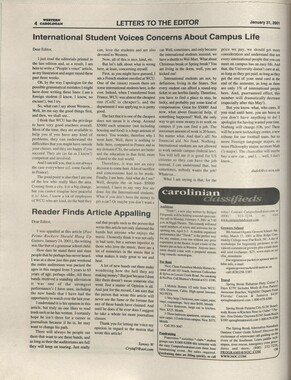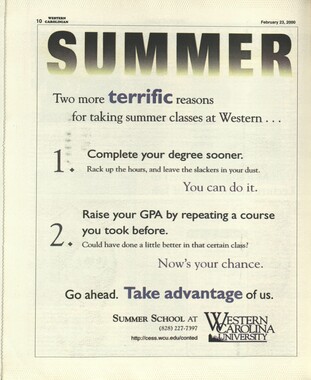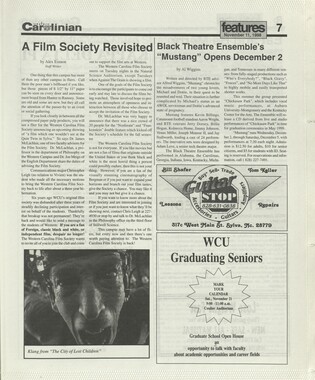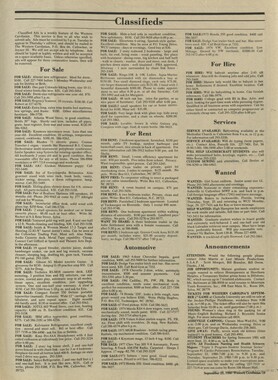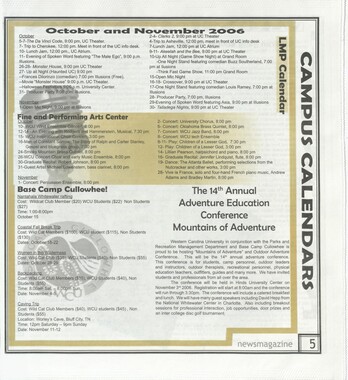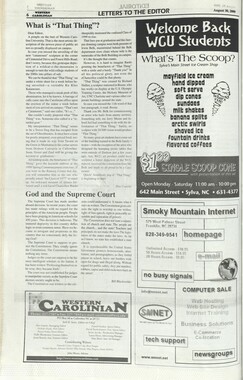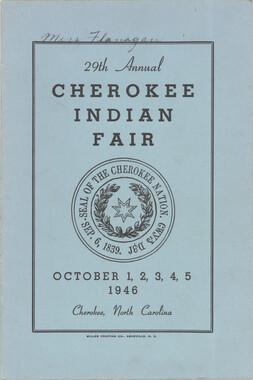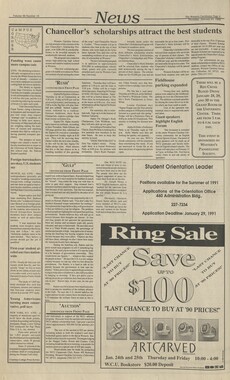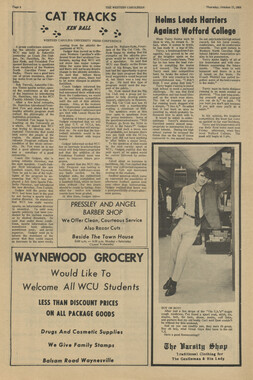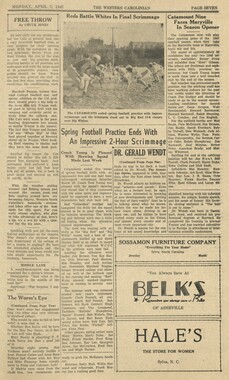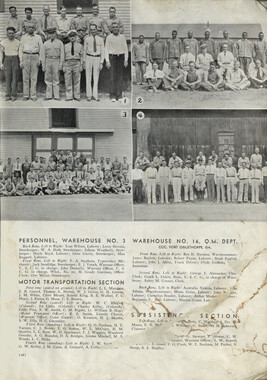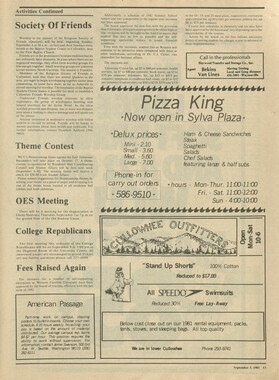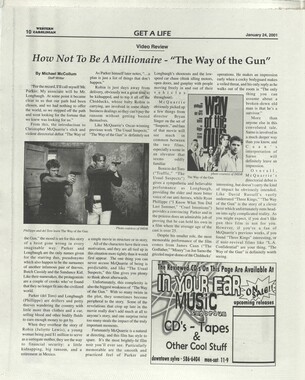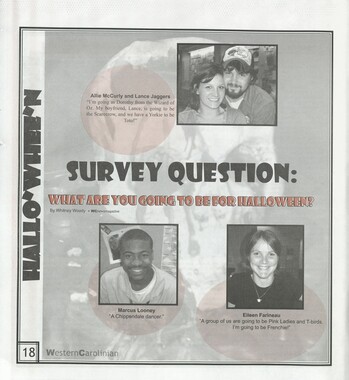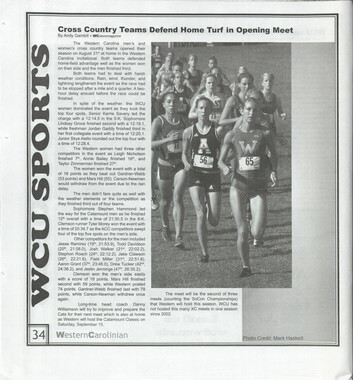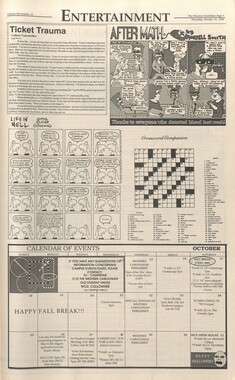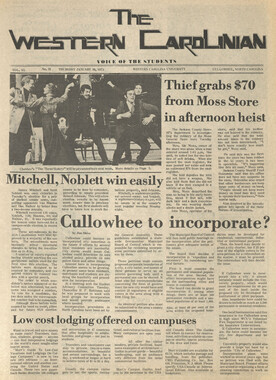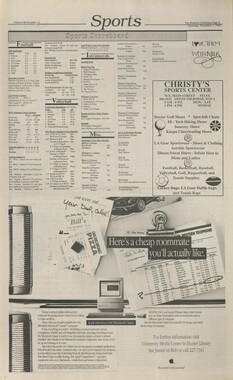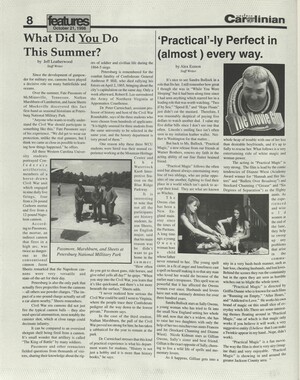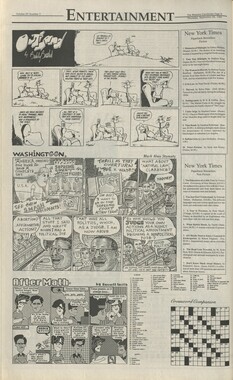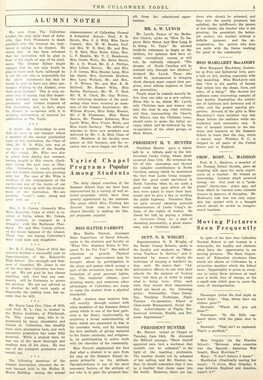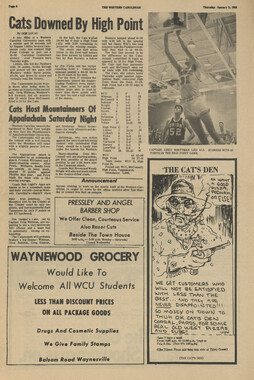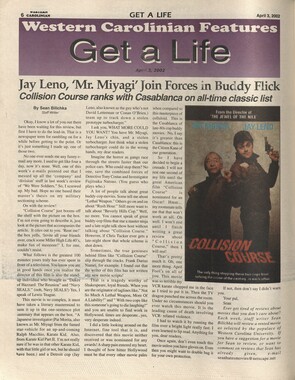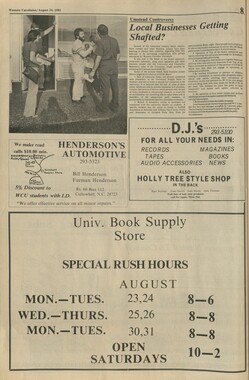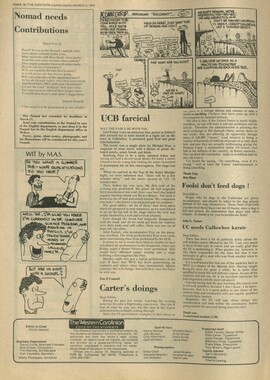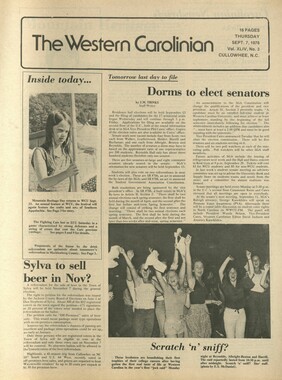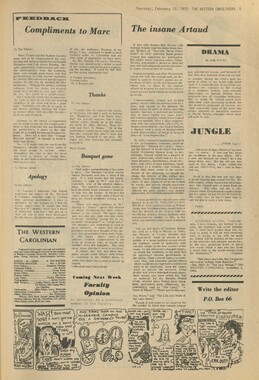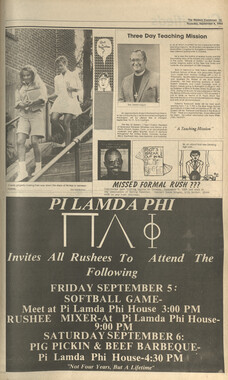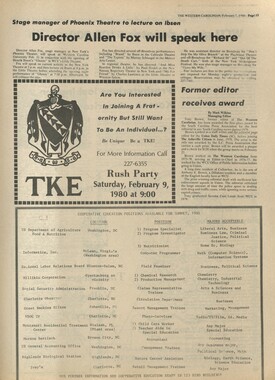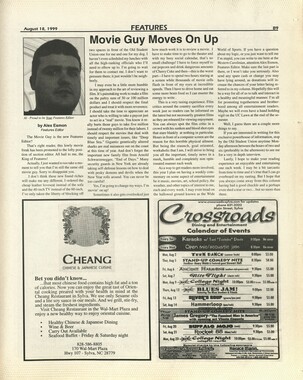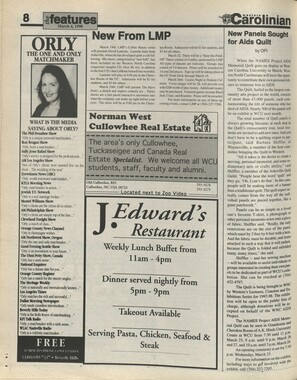Western Carolina University (21)
View all
- Canton Champion Fibre Company (2308)
- Cherokee Traditions (291)
- Civil War in Southern Appalachia (165)
- Craft Revival (1942)
- George Masa Collection (137)
- Great Smoky Mountains - A Park for America (3182)
- Highlights from Western Carolina University (422)
- Horace Kephart (998)
- Journeys Through Jackson (159)
- LGBTQIA+ Archive of Jackson County (90)
- Oral Histories of Western North Carolina (318)
- Picturing Appalachia (6617)
- Stories of Mountain Folk (413)
- Travel Western North Carolina (153)
- Western Carolina University Fine Art Museum Vitreograph Collection (129)
- Western Carolina University Herbarium (92)
- Western Carolina University: Making Memories (738)
- Western Carolina University Publications (2491)
- Western Carolina University Restricted Electronic Theses and Dissertations (146)
- Western North Carolina Regional Maps (71)
- World War II in Southern Appalachia (131)
University of North Carolina Asheville (6)
View all
- Allanstand Cottage Industries (62)
- Appalachian National Park Association (53)
- Bennett, Kelly, 1890-1974 (1463)
- Berry, Walter (76)
- Brasstown Carvers (40)
- Carver, George Washington, 1864?-1943 (26)
- Cathey, Joseph, 1803-1874 (1)
- Champion Fibre Company (233)
- Champion Paper and Fibre Company (297)
- Cherokee Indian Fair Association (16)
- Cherokee Language Program (22)
- Crowe, Amanda (40)
- Edmonston, Thomas Benton, 1842-1907 (7)
- Ensley, A. L. (Abraham Lincoln), 1865-1948 (275)
- Fromer, Irving Rhodes, 1913-1994 (70)
- George Butz (BFS 1907) (46)
- Goodrich, Frances Louisa (120)
- Grant, George Alexander, 1891-1964 (96)
- Heard, Marian Gladys (60)
- Kephart, Calvin, 1883-1969 (15)
- Kephart, Horace, 1862-1931 (313)
- Kephart, Laura, 1862-1954 (91)
- Laney, Gideon Thomas, 1889-1976 (439)
- Masa, George, 1881-1933 (61)
- McElhinney, William Julian, 1896-1953 (44)
- Niggli, Josephina, 1910-1983 (10)
- North Carolina Park Commission (105)
- Osborne, Kezia Stradley (9)
- Owens, Samuel Robert, 1918-1995 (11)
- Penland Weavers and Potters (36)
- Roberts, Vivienne (15)
- Roth, Albert, 1890-1974 (142)
- Schenck, Carl Alwin, 1868-1955 (1)
- Sherrill's Photography Studio (2565)
- Southern Highland Handicraft Guild (127)
- Southern Highlanders, Inc. (71)
- Stalcup, Jesse Bryson (46)
- Stearns, I. K. (213)
- Thompson, James Edward, 1880-1976 (226)
- United States. Indian Arts and Crafts Board (130)
- USFS (683)
- Vance, Zebulon Baird, 1830-1894 (1)
- Weaver, Zebulon, 1872-1948 (58)
- Western Carolina College (230)
- Western Carolina Teachers College (282)
- Western Carolina University (2008)
- Western Carolina University. Mountain Heritage Center (18)
- Whitman, Walt, 1819-1892 (10)
- Wilburn, Hiram Coleman, 1880-1967 (73)
- Williams, Isadora (3)
- Cain, Doreyl Ammons (0)
- Crittenden, Lorraine (0)
- Rhodes, Judy (0)
- Smith, Edward Clark (0)
- Appalachian Region, Southern (3032)
- Asheville (N.C.) (1945)
- Avery County (N.C.) (26)
- Blount County (Tenn.) (200)
- Buncombe County (N.C.) (1680)
- Cherokee County (N.C.) (283)
- Clay County (N.C.) (556)
- Graham County (N.C.) (247)
- Great Smoky Mountains National Park (N.C. and Tenn.) (535)
- Haywood County (N.C.) (3573)
- Henderson County (N.C.) (70)
- Jackson County (N.C.) (4926)
- Knox County (Tenn.) (61)
- Knoxville (Tenn.) (21)
- Lake Santeetlah (N.C.) (14)
- Macon County (N.C.) (421)
- Madison County (N.C.) (216)
- McDowell County (N.C.) (39)
- Mitchell County (N.C.) (135)
- Polk County (N.C.) (35)
- Qualla Boundary (982)
- Rutherford County (N.C.) (78)
- Swain County (N.C.) (2187)
- Transylvania County (N.C.) (270)
- Watauga County (N.C.) (12)
- Waynesville (N.C.) (86)
- Yancey County (N.C.) (72)
- Aerial Photographs (3)
- Aerial Views (60)
- Albums (books) (4)
- Articles (1)
- Artifacts (object Genre) (228)
- Bibliographies (1)
- Biography (general Genre) (2)
- Cards (information Artifacts) (38)
- Clippings (information Artifacts) (193)
- Copybooks (instructional Materials) (3)
- Crafts (art Genres) (622)
- Depictions (visual Works) (21)
- Design Drawings (1)
- Digital Moving Image Formats (2)
- Drawings (visual Works) (185)
- Envelopes (115)
- Exhibitions (events) (1)
- Facsimiles (reproductions) (1)
- Fiction (general Genre) (4)
- Financial Records (12)
- Fliers (printed Matter) (67)
- Glass Plate Negatives (381)
- Guidebooks (2)
- Internegatives (10)
- Interviews (823)
- Land Surveys (102)
- Letters (correspondence) (1070)
- Manuscripts (documents) (618)
- Maps (documents) (177)
- Memorandums (25)
- Minutes (administrative Records) (59)
- Negatives (photographs) (6192)
- Newsletters (1290)
- Newspapers (2)
- Notebooks (8)
- Occupation Currency (1)
- Paintings (visual Works) (1)
- Pen And Ink Drawings (1)
- Periodicals (194)
- Personal Narratives (10)
- Photographs (12977)
- Plans (maps) (1)
- Poetry (6)
- Portraits (4573)
- Postcards (329)
- Programs (documents) (181)
- Publications (documents) (2444)
- Questionnaires (65)
- Relief Prints (26)
- Sayings (literary Genre) (1)
- Scrapbooks (282)
- Sheet Music (2)
- Slides (photographs) (402)
- Songs (musical Compositions) (2)
- Sound Recordings (802)
- Specimens (92)
- Speeches (documents) (18)
- Tintypes (photographs) (8)
- Transcripts (329)
- Text Messages (0)
- A.L. Ensley Collection (275)
- Appalachian Industrial School Records (7)
- Appalachian National Park Association Records (336)
- Axley-Meroney Collection (2)
- Bayard Wootten Photograph Collection (20)
- Bethel Rural Community Organization Collection (7)
- Blumer Collection (5)
- C.W. Slagle Collection (20)
- Canton Area Historical Museum (2110)
- Carlos C. Campbell Collection (564)
- Cataloochee History Project (64)
- Cherokee Studies Collection (4)
- Daisy Dame Photograph Album (5)
- Daniel Boone VI Collection (1)
- Doris Ulmann Photograph Collection (112)
- Elizabeth H. Lasley Collection (1)
- Elizabeth Woolworth Szold Fleharty Collection (4)
- Frank Fry Collection (95)
- George Masa Collection (173)
- Gideon Laney Collection (452)
- Hazel Scarborough Collection (2)
- Hiram C. Wilburn Papers (28)
- Historic Photographs Collection (236)
- Horace Kephart Collection (861)
- Humbard Collection (33)
- Hunter and Weaver Families Collection (1)
- I. D. Blumenthal Collection (4)
- Isadora Williams Collection (4)
- Jesse Bryson Stalcup Collection (47)
- Jim Thompson Collection (224)
- John B. Battle Collection (7)
- John C. Campbell Folk School Records (80)
- John Parris Collection (6)
- Judaculla Rock project (2)
- Kelly Bennett Collection (1482)
- Love Family Papers (11)
- Major Wiley Parris Civil War Letters (3)
- Map Collection (12)
- McFee-Misemer Civil War Letters (34)
- Mountain Heritage Center Collection (4)
- Norburn - Robertson - Thomson Families Collection (44)
- Pauline Hood Collection (7)
- Pre-Guild Collection (2)
- Qualla Arts and Crafts Mutual Collection (12)
- R.A. Romanes Collection (681)
- Rosser H. Taylor Collection (1)
- Samuel Robert Owens Collection (94)
- Sara Madison Collection (144)
- Sherrill Studio Photo Collection (2558)
- Smoky Mountains Hiking Club Collection (616)
- Stories of Mountain Folk - Radio Programs (374)
- The Reporter, Western Carolina University (510)
- Venoy and Elizabeth Reed Collection (16)
- WCU Gender and Sexuality Oral History Project (36)
- WCU Mountain Heritage Center Oral Histories (25)
- WCU Oral History Collection - Mountain People, Mountain Lives (71)
- WCU Students Newspapers Collection (1923)
- Western North Carolina Tomorrow Black Oral History Project (69)
- William Williams Stringfield Collection (2)
- Zebulon Weaver Collection (109)
- African Americans (390)
- Appalachian Trail (35)
- Artisans (521)
- Cherokee art (84)
- Cherokee artists -- North Carolina (10)
- Cherokee language (21)
- Cherokee pottery (101)
- Cherokee women (208)
- Church buildings (190)
- Civilian Conservation Corps (U.S.) (114)
- College student newspapers and periodicals (2012)
- Dams (115)
- Dance (1023)
- Education (222)
- Floods (63)
- Folk music (1015)
- Forced removal, 1813-1903 (2)
- Forest conservation (220)
- Forests and forestry (1198)
- Gender nonconformity (4)
- Great Smoky Mountains National Park (N.C. and Tenn.) (181)
- Hunting (47)
- Landscape photography (25)
- Logging (122)
- Maps (83)
- Mines and mineral resources (9)
- North Carolina -- Maps (18)
- Paper industry (38)
- Postcards (255)
- Pottery (135)
- Railroad trains (72)
- Rural electrification -- North Carolina, Western (3)
- School integration -- Southern States (2)
- Segregation -- North Carolina, Western (5)
- Slavery (5)
- Sports (452)
- Storytelling (243)
- Waterfalls -- Great Smoky Mountains (N.C. and Tenn.) (66)
- Weaving -- Appalachian Region, Southern (280)
- Wood-carving -- Appalachian Region, Southern (328)
- World War, 1939-1945 (174)
Western Carolinia Volume 47 Number 02, September 2, 1982
Item
Item’s are ‘child’ level descriptions to ‘parent’ objects, (e.g. one page of a whole book).
-
-
Western Carolinian/September 2, 1982 5 By-Pass Experience by Robert Zipperer The prospect of a long, healthv lite is something which concerns us all, lor the alternative is something which we would rather not think about However, over the past live months, that alternative has weighed heavilv on the minds ol a number of gentlemen in the University communitv. On May 12th. John McC'racken. Director ot Auxiliar) Services underwent quadruple coronarv by- pass surgery in Asheville'! Memorial Mission Hospital. "When you are faced with this, your immediate thought is, "what could I have done differently to prevent the situation'1' " By the results ot an angiagram, or Cardiac Catheterization, a process which has been used extensively only over the past fifteen years, McC'racken was diagnosed to have blockages in 4 arteries. He is not alone. Dr James Doolev, Vice Chancellor for Development and Special Services, encountered a similar situation. Results from his angiagram showed an 80-90', blockage in one artery and lesser blockage in two Others. Alter episodes with chest pains. Doolev underwent triple by-pass surgery on July 12th at Memorial Mission. "If this had happeded tit teen or t went) v eat sago. m> options would not have been so positive." Dr. Dennis Mckevlin. associate professor of English, experienced the same procedure two days later, after symptoms of shortness of breath, chest pains, and severe headaches, Aftei tests at C.J. Harris Hospital in Sylva, he too was referred to Memorial Mission Of hsi operation McKevlin advised that he", felt trepidation to be put to sleep." The first thing he noticed alter regaining consciousness was the "...proliferation of clocks in the Intensive Care Unit." He thought ol the Renaissancean concept of "...clocks in general, to I ime in particular..." which struck the English professor with this reflective note: "When vou start thinking of time, you start thinking of life and eternity in its relation to man." He added that the operation was "...the closest thing one can imagine to being dead...a machine breathes for vou." In his relationship to machines, McKevlin would much rather drive one. "What a great thing it is to get behind the wheel again!" All three men were anxious to return to work. McC'racken returned to his duties on July 20th. a scant nine weeks from his operation. Dr. Dooley returned to his office yesterday and will be "easing back to his duties over the next few months...," while Dr. McKevlin plans to return to the classroom in mid October. Their humor certainly hasn't suffered from their ordeals. All three chimed with a chorus, "...there must be an easier way to lose weight!" McKevlin said he hesitated to ask his doctor about how the sternum was opened. "I didn't think I wanted to know. When I found out. I was sure 1 didn't want to know." The gentlemen praised the treatment thev received at both C.J. Harris and Memorial Mission Hospitals and by the Asheville Cardiology Associates. Jheir doctors have provided them with new guidelines for li\ing. "I enjoy eating." moaned McC'racken relating to his new diet in which he must refrain from fatty meats, partake only limited fried foods, and preferably eat boiled unseasoned vegetables. But. to prevent further heart disease, he is willing to make the sacrifice. McC'racken again stressed the importance ot preventative measures for those who may wish to avoid a similar occurence. Factors such as a family historv ot coronarv disease, diabetes, and high blood pressure should be monitored bv vour physician; however, smoking, obesitv. a high cholesteral intake, and the prevalence ot stress in our lives can be controlled bv the individual alone. Ihe gentlemen all agreed it is something each person should consider in the wav thev choose to live their lives. Ot course, one may take the fatalistic view that such occurrences will happen regardless ol our abiliti. prevent them; but. with the advances in medicine and the tlood ol literature on preventative measures, there is much we can do to avoid, as McKev lin noted, something "vou don't want to happen " Should the situation occur in vour life, the surgery is a successful alternative As Dr. Doolev pointed out. "...One of the very encouraging aspects ol the whole experience is that, although the recovery is long and slow, one can expect to live a very active lite " I hi more information on Bv-pass surgery, angiagianis. and preventative measures, write the Asheville Cardiology Associates at 509 Biltmore Avenue, Asheville, NC. photo by Mark Haskett Alcohol Alcohol beverages have been a source of both pleasure and problems since the beginning of mankind. They have been recognized throughout the ages as a source of relaxation, pleasure and conviviality, as well as nourishing the body, restoring and preserving health. Yet history shows that irresponsible use of alcohol can be destructive to individuals, families and societies. Contrary to popular belief, the majority of problem drinkers are not "skid row bums." This population comprises of only 3 to 5 percent of alcoholics in America. In fact, the proportion of heavy drinkers increases fairly steadily from 6 percent of those with grammar school education to 15 percent of those who are college graduates. Problem drinkers are defined as persons experiencing negative behavioral consequences resulting from alcohol use. Using this definition, 10 to 15 percent of the students surveyed at various universities around the country were considered to be problem drinkers, and 30 to 45 percent said they had driven after several drinks during the previous year. The answer to the problem is not prohibition, but rather prudence. Ihe question is not so much whether to drink or not to drink, but rather, if you choose to drink, how to be a responsible drinker. The Campus Alcohol Information Center will try to provide you with some advice and a few guidelines to help you to do just that. Look for the CAIC spot in future editions of the Western Carolinian. Campus Alcohol Information Center.Office of Student Housing, 227-7303. photo by Mark Haskett VOICE Helps Elderly There are 3.636 elderly folks living in Jackson County. Many have need of friendship and transportation from someone who cares. Would you like to be a trained VOICE volunteer'.' VOICE (Volunteer in Concern for the Elderly) is a program of the Home Supportive Services, a vital part of the C.I Harris Community Hospital Home Health Service Agency. VOICE is actively seekingand in need of volunteers to serve the homebound elderly of Jackson County. Special training is provided for all volunteers. The next training session is scheduled for Friday evening, Sept. 24, from 6:30 to 9:30 p.m. and Saturday morning, Sept. 25, from 9 a.m. to I p.m. in the Community Services Building in Sylva. This training session will cover the psychological aspects of aging, the role of the volunteer as friend, the mechanics of helping people in wheelchairs and walkers, as well as the necessary communication skills needed to work with the hearing and visually impared. The Home Health Service Agency works with 150- 175 elderly homebound folks per month, and VOICE volunteers share vitally in this service. The need is great for more volunteers to help with these elderly in getting to medical appointments, assisting with grocery shopping, and always for friendly visiting. Anyone 18 years of age or over who has the time and is available to help as a volunteer is encouraged to call Kathy Pieper, VOICE volunteer coordinator at 586-8941 ext. 404. for an application and interview. Trained volunteers who provide travel for medical and grocery transportation may receive travel reimbursement, and all trained volunteers are protected under an insurance program. Community Vs. WCU by Alex Kekesi photo by Tim Schutz Climate Changes Before the middle of the next century, the world may undergo drastic climatic changes which will greatly affect the quality of life as we know it. Scientists who specialize in studying energy consumption have made this alarming prediction, based on the long-term results of our present and almost total dependence on fossil fuels (oil, natural gas and coal). It is forseen that the carbon-dioxide released from these fuels would build up in the atmosphere to such a degree, that the sun's energy could fiher through, but the earth's heat could not escape. The result in the atmosphere would be like that of a greenhouse. The results for the world would be disastrous. Temperatures would rise, at first gradually, then at a more accelerated pace, eventually to tropical levels. The melting ice masses from the Arctic would bring the oceans to such a level, that large land areas—including half of North Carolina and all of Florida would be under water. It may sound like science-fiction, but then, so did a lot of present actualities not very long ago. Dr. Dan Pittillo. professor of ecology at WCU affirms the credibility of such long-term effects on the environment. "I don't expect a noticeable effect within a century. The Oceans have a vast capacity to absorb carbon dioxide. Not for one century would there be perceptible climatic changes, maybe an average increase of ten degrees Farenheit." Asked whether any particular areas would be hardest hit. Dr. Pittillo said "the low-lying coastal areas, Florida, for example." As for a solution. "It would be difficult to take strong measures without triggering serious imbalances in the economy."(i.e. from, a forced cutdown in energy consumption) Dr. Pittillo concluded by expressing optimism that solutions would be found before the greenhouse effect becomes a serious problem. Mitigating a situation such as predicted is possible, but would require the effort of those it'would most affect. A solution is in conservation of energy, development of alternate energy sources and closer, more co-operative international involvement. The latter is, for political reasons, extremely unlikely, and conservation is difficult to enforce. The development of alternate energy sources (e.g. nuclear energy) is slow in face of pu,blic controversy. It is difficult to make long-term benefits a priority when individual convenience must be sacrificed for a common good. Voluntary conservation would seem preferable to inure-to an uncertain climate in the not-to-distant future. Any prognosis need not necessarily be negative and pessimistic. For example, man could develop a technology to utilize a high water level for agriculture. An article on the effects of carbon-dioxide in August's Scientific American concludes with an affirmation of man's ability to surmount difficult obstacles. It is to such an attitude that we must address ourselves. by James Itt Saturday. August 21. Ed Pomerantz was given a sheet of paper containing a directory of local motels, one of which was the A.K. Hinds University Center, located on the West end of campus. Pomerantz called the number beside the listing, told them that he was not a student with the University, but that he was visiting a friend attending Orientation, and that he needed a room. Because of his affiliation with the Concerned Citizens /or Free Enterprise (CCFE), he gave them the name of Ed Neff and was then billed S22.88 for room 122. On Sunday, he went to pay for his room and was asked for no identification. Pomerantz scheduled a press conference that was interupted by school officials, who asked them to leave under the threat of force. Pomerantz was given a refund and he left with his friends. The point Mr. Pomerantz was attempting to prove was the simplicity involved in getting a room from the University. The College is supposed to provide room and board to students, but the accomodations for non-students falls into the gray area of the law at this point. However, in Pomerantz's view, the act is a violation of the Umstead Act. which forbids the Government and its Agencies from competing with private enterprise. The room that he rented should have been at a local motel instead of the college, in his opinion. Pomerantz's wife. Jane Dillard Pomerantz, proprieter of Justjanes Restaurant, says the Top of the Stairs restaurant on campus has hurt her business, especially since it serves non-students also. This is a direct violation of the Umstead Act in her point of view. A number of staff personnel at Justjanes felt that the Top of the Stairs was not a service that should be provided by the College, but that instead, should be handled by outside business, since the University already runs the two cafeterias. Another controversial enterprise is the recent expansion of the merchandise selection at the "University Book Store. The CCFE feels that the sales of record albums, greeting cards, gifts and other similar items should not be the responsibility of Western Carolina University. They pointed out that the merchandise aforementioned was not necessary merchandise, again a violation of the Umstead Act. in the opinion of the CCFE. The problems boil down to two things: The interpretation of the Umstead Act and the University's unwillingness to settle the issue at this time. Mr. Pomerantz has characterized Chancellor Robinson as being "not willing to discuss any compromise." He also reported the meeting set up at the Chancellor's office, at an equally convenient time for both sides, to discuss the Umstead Act. At the meeting. Chancellor Robinson entered the room, explained that he had a visitor from England and that he wouldn't be able to attend the meeting. He then told the assemblage that the three men who had come with them to the meeting would explain the Umstead Act. "The Chancellor refused to attend his own meeting." noted Pomerantz. Neither Pomerantz nor his wife, know of any contact the University has made to them or the CCFE. Pomerantz pointed out the situation of the College never saying that they hadn't violated the law." just never saying that they hadn't violated the law. "just categorical denials" were in his words. The CCFE is open to dialogue with WCU and hopes to hear from them soon. Pomerantz has stated many times that he and the organization that he belongs to is not. under any circumstances. 'Anti-University,' and that they are with the University, but WCU is breaking the law and people are hurting from it. Again, the problem boils down to the definition of the Umstead Act and Pomerantz feels that. "It may well be that the courts have to decide."
Object
Object’s are ‘parent’ level descriptions to ‘children’ items, (e.g. a book with pages).
-
The Western Carolinian is Western Carolina University's student-run newspaper. The paper was published as the Cullowhee Yodel from 1924 to 1931 before changing its name to The Western Carolinian in 1933.
-
